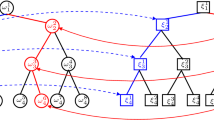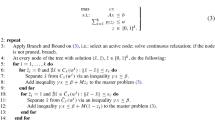Abstract
The unit commitment problem, aims at computing the production schedule that satisfies the offer-demand equilibrium at minimal cost. Often such problems are considered in a deterministic framework. However uncertainty is present and non-negligible. Robustness of the production schedule is therefore a key question. In this paper, we will investigate this robustness when hydro valleys are made robust against uncertainty on inflows and the global schedule is robust against uncertainty on customer load. Both robustness requirements will be modelled by using bilateral joint chance constraints. Since this is a fairly large model, we will investigate several decomposition procedures and compare these on several typical numerical instances. The latter decomposition procedures are clearly a prerequisite if robust unit commitment is ever to be used in practice. We will show that an efficient decomposition procedure exists and can be used to derive a robust production schedule. The obtained results are illustrated on a convex simplification of a unit commitment problem in order to avoid the use of heuristics. The investigated decomposition approaches can be applied trivially to a non-convex setting, but will need to be followed by appropriate heuristics. How this may work in practice is also illustrated.






Similar content being viewed by others
References
Babonneau F, Vial J, Apparigliato R (2010) Robust optimization for environmental and energy planning (Chapter 3 in [21]), International series in operations research & management science. Springer, vol 138
Batut J, Renaud A (1992) Daily scheduling with transmission constraints: a new class of algorithms. IEEE Trans Power Syst 7(3):982–989
Beltran C, Heredia F (2002) Unit commitment by augmented lagrangian relaxation: testing two decomposition approaches. J Optim Theory Appl 112(2):295–314
Bertsimas D, Litvinov E, Sun XA, Zhao J, Zheng T (2013) Adaptive robust optimization for the security constrained unit commitment problem. IEEE Trans Power Syst 28(1):52–63
Bonnans J, Gilbert J, Lemaréchal C, Sagastizábal C (2006) Numerical optimization: theoretical and practical aspects, 2nd edn. Springer
Borghetti A, Frangioni A, Lacalandra F, Nucci C (2003) Lagrangian heuristics based on disaggregated bundle methods for hydrothermal unit commitment. IEEE Trans Power Syst 18:313–323
Briant O, Lemaréchal C, Meurdesoif P, Michel S, Perrot N, Vanderbeck F (2008) Comparison of bundle and classical column generation. Math Program 113(2):299–344
Bruhns A, Deurveilher G, Roy J (2005) A non-linear regression model for mid-term load forecasting and improvements in seasonality. PSCC 2005 Luik
Cohen G (1980) Auxiliairy problem principle and decomposition of optimization problems. J Optim Theory Appl 32(3):277–305
Cohen G, Zhu D (1983) Decomposition-coordination methods in large-scale optimization problems. the non-differentiable case and the use of augmented Lagrangians. Large scale systems, theory and applications 1
Dentcheva D (2009) Optimisation models with probabilistic constraints. Chapter 4 in [43]. MPS-SIAM series on optimization. SIAM and MPS, Philadelphia
de Oliveira W, Sagastizábal C (2014) Level bundle methods for oracles with on demand accuracy. Optim Methods Softw, pp 1–31
Ding X, Lee WJ, Jianxue W, Liu L (2010) Studies on stochastic unit commitment formulation with flexible generating units. Electric Power Syst Res 80:130141
Doukopoulos-Hechmé G, Charousset-Brignol S, Malick J, Lemaréchal C (2010) The short-term electricity production management problem at EDF. OPTIMA 84:2–6
Dubost L, Gonzalez R, Lemaréchal C (2005) A primal-proximal heuristic applied to french unitcommitment problem. Math Program 104(1):129–151
Duranyildiz I, Önöz B, Bayazit M (1999) A chance-constrained LP model for short term reservoir operation optimization. Turkish J Eng 23:181–186
Edirisinghe N, Patterson E, Saadouli N (2000) Capacity planning model for a multipurpose water reservoir with target-priority operation. Ann Oper Res 100:273–303
Filar J, Haurie A (2010) Uncertainty and environmental decision making: a handbook of research and best practice, international series in operations research & management science, vol 138. Springer
Frangioni A, Gentile C (2006) Solving non-linear single-unit commitment problems with ramping constraints. Oper Res 54(4):767–775
Frangioni A, Gentile C, Lacalandra F (2008) Solving unit commitment problems with general ramp contraints. Int J Electric Power Energy Syst 30:316–326
Frangioni A, Gentile C, Lacalandra F (2011) Sequential lagrangian-MILP approaches for unit commitment problems. Int J Electric Power Energy Syst 33:585–593
Guignard M (2003) Lagrangean relaxation. TOP 11(2):151–228
Hiriart-Urruty J, Lemaréchal C (1996) Convex analysis and minimization algorithms II, 2nd edn. No. 306 in Grundlehren der mathematischen Wissenschaften. Springer
Jünger M, Naddef D (eds) (2001) Computational combinatorial optimization: optimal or provably near-optimal solutions. Lecture Notes in Computer Science. Springer
Langrene N, van Ackooij W, Bréant F (2011) Dynamic constraints for aggregated units: formulation and application. IEEE Trans Power Syst 26(3):1349–1356
Lemaréchal C (2001) Lagrangian relaxation. In [27] (Chapter 4). Springer
Lemaréchal C, Sagastizábal C (1994) An approach to variable metric bundle methods. Lect Notes Control Inform Sci 197:144–162
Lemaréchal C, Sagastizábal C (1997) Variable metric bundle methods: from conceptual to implementable forms. Math Program 76(3):393–410
Loucks DP, Stedinger JR, Haith DA (1981) Water resource systems planning and analysis. Prentice-Halls, Inc.
Nowak M, Römisch W (2000) Stochastic lagrangian relaxation applied to power scheduling in a hydro-thermal system under uncertainty. Ann Oper Res 100(1–4):251–272
Ozturk U, Mazumdar M, Norman B (2004) A solution to the stochastic unit commitment problem using chance constrained programming. IEEE Trans Power Syst 19(3):1589–1598
Philpott A, Craddock M, Waterer H (2000) Hydro-electric unit commitment subject to uncertain demand. Eur J Oper Res 125:410–424
Prékopa A (1995) Stochastic programming. Kluwer, Dordrecht
Prékopa A (2003) Probabilistic programming. In [41] (Chapter 5). Elsevier, Amsterdam
Prékopa A, Szántai T (1978) Flood control reservoir system design using stochastic programming. Math Program Study 9:138–151
Ruszczyński A (1995) On convergence of an augmented lagrangian decomposition method for sparse convex optimization. Math Oper Res 20(3):634–656
Ruszczyński A, Shapiro A (2003) Stochastic programming, handbooks in operations research and management science, vol 10. Elsevier, Amsterdam
Sagastizábal C (2012) Divide to conquer: decomposition methods for energy optimization. Math Program 134(1):187–222
Shapiro A, Dentcheva D, Ruszczyński A (2009) Lectures on stochastic programming. Modeling and theory, MPS-SIAM series on optimization, vol. 9. SIAM and MPS, Philadelphia
Soenen R (1977) Contribution à l’étude des systèmes de conduite en temps réel en vue de la commande d’unités de fabrication. Ph.D. thesis, University of Lille
Szántai T (1988) A computer code for solution of probabilistic-constrained stochastic programming problems. In: Ermoliev Y, Wets RJ-B (eds) Numerical techniques for stochastic optimization, pp 229–235
Tahanan M, van Ackooij W, Frangioni A, Lacalandra F (2014) Large-scale unit commitment under uncertainty: a literature survey. Preprint available http://compass2.di.unipi.it/TR/default.aspx
Takriti S, Birge J, Long E (1996) A stochastic model for the unit commitment problem. IEEE Trans Power Syst 11:1497–1508
Takriti S, Krasenbrink B, Wu L (2000) Incorporating fuel constraints and electricity spot prices into the stochastic unit commitment problem. Oper Res 48(2):268–280
van Ackooij W, de Oliveira W (2014) Level bundle methods for constrained convex optimization with various oracles. Comput Optim Appl 57(3):555–597
van Ackooij W, Sagastizábal C (2014) Constrained bundle methods for upper inexact oracles with application to joint chance constrained energy problems. Siam J Optim 24(2):733–765
van Ackooij W, Henrion R, Möller A, Zorgati R (2010) On probabilistic constraints induced by rectangular sets and multivariate normal distributions. Math Methods Oper Res 71(3):535–549
van Ackooij W, Henrion R, Möller A, Zorgati R (2014) Joint chance constrained programming for hydro reservoir management. Optim Eng 15:509–531
Veinott A (1967) The supporting hyperplane method for unimodal programming. Oper Res 15:147–152
Wang S, Shahidehpour S, Kirschen D, Mokhtari S, Irisarri G (1995) Short-term generation scheduling with transmission and environmental constraints using an augmented lagrangian relaxation. IEEE Trans Power Syst 10(3):1294–1301
Wu L, Shahidehpour M, Li T (2007) Stochastic security-constrained unit commitment. IEEE Trans Power Syst 22(2)
Zhao L, Zeng B (2012) Robust unit commitment problem with demand response and wind energy. In: Proceedings of IEEE power and energy society general meeting
Acknowledgments
The author would like to thank René Henrion, Claudia Sagastizábal and Nadia Oudjane for the ongoing collaboration and their comments on this paper.
Author information
Authors and Affiliations
Corresponding author
Rights and permissions
About this article
Cite this article
van Ackooij, W. Decomposition approaches for block-structured chance-constrained programs with application to hydro-thermal unit commitment. Math Meth Oper Res 80, 227–253 (2014). https://doi.org/10.1007/s00186-014-0478-5
Received:
Accepted:
Published:
Issue Date:
DOI: https://doi.org/10.1007/s00186-014-0478-5
Keywords
- Chance constraint programming
- Decomposition methods
- Operations research in energy
- Stochastic programming
- Unit commitment




